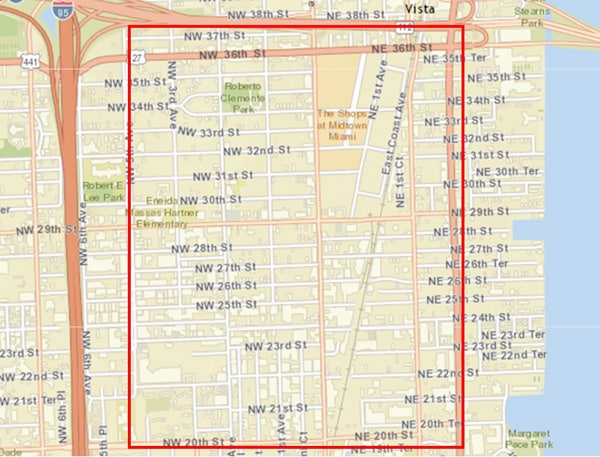April 7, 2020 by John Fernandez
Zika & Pregnancy: Prevention and CDC Miami Travel Warning (Video)

(Video caption: Pregnant women can reduce the risk of contracting the Zika virus by following several guidelines, according to Ellen Schwartzbard, M.D., an obstetrician and gynecologist affiliated with South Miami Hospital.)
The U.S. Center for Disease Control and Prevention (CDC) has issued a Miami travel warning related to the Zika virus and pregnant women. The warning applies to a specific neighborhood in Miami, located north of the downtown area. [See map below.]
“The Florida Department of Health has identified an area in one neighborhood of Miami where Zika is being spread by mosquitoes,” the CDC reported. “Pregnant women should not travel to this area.”
Zika, already prevalent in much of Latin America and the Caribbean, is believed to cause microcephaly when contracted in pregnancy. This is a serious birth defect in which babies are born with abnormally small heads and other health concerns, according to Ellen Schwartzbard, M.D., an obstetrician and gynecologist affiliated with South Miami Hospital. (Please watch the video below for more information about Zika and pregnancy.)
Last Friday, (July 29), the Florida Department of Health confirmed that four people in Miami-Dade and Broward Counties represent the state’s first confirmed cases of locally transmitted Zika virus.
Florida health officials say that an “active transmission” of the Zika virus is likely occurring in one small area of Miami-Dade County — just north of downtown — that includes Wynwood, a neighborhood in Miami. Public health officials are investigating four suspected cases of likely local transmission in people who live in Miami-Dade and Broward Counties . No “active transmission” areas were cited in Broward County.
. No “active transmission” areas were cited in Broward County.
The exact “active transmission” location in Miami targeted by health officials is about one-square mile, and is within the following boundaries: NW 5th Avenue to the west, US 1 to the east, NW/NE 38th Street to the north and NW/NE 20th Street to the south.
“While no mosquitoes trapped tested positive for the Zika virus, the department believes these cases were likely transmitted through infected mosquitoes in this area,” says the Florida Health Department.
“Florida’s small case cluster is not considered widespread transmission,” state officials say. “However, pregnant women are advised to avoid non-essential travel to the impacted area in Miami-Dade County.” (See map at the left.)
In regards to the Wynwood area of Miami, the CDC recommends a series of steps for pregnant women and their partners:
- Pregnant women should not travel to this area.
- Pregnant women and their partners living in this area should follow steps to prevent mosquito bites.
- People who live in or traveled to this area and who have a pregnant sex partner should use condoms or other barriers to prevent infection every time they have sex or not have sex during the pregnancy.
- All pregnant women in the United States should be assessed for possible Zika virus exposure during each prenatal care visit.
- Pregnant women who live in or frequently travel to this area should be tested in the first and second trimester of pregnancy.
- Pregnant women with possible Zika exposure and signs or symptoms of Zika should be tested for Zika.
- Pregnant women who traveled to or had unprotected sex with a partner that traveled to or lives in this area should talk to their healthcare provider and should be tested for Zika.
Source: CDC
Statewide, there are a total 333 cases of Zika, including 99 in Miami-Dade County and 55 in Broward County, as of Aug. 1. Additionally, there are another 55 cases involving pregnant women throughout the state. Most of the cases are linked to travel.
The Baptist Health South Florida News Team spoke with Dr. Schwartzbard about how pregnant women can protect themselves from the Zika virus. Watch now.
top stories












There are no comments